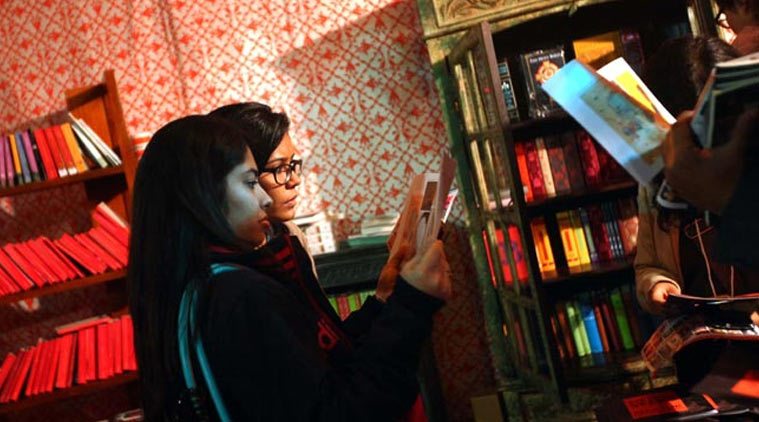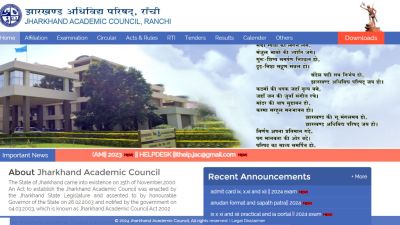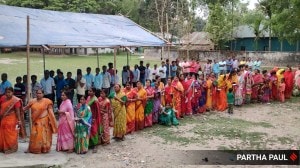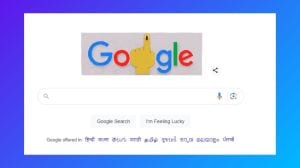- India
- International
A lively, literary Lahore
The literary festival hosted by the city saw a coming together of creativity, eclecticism, ideas and dialogue.
 By the third day, there were more people at the festival than there was space and Pakistan’s great novelist, Abdullah Hussain had hundreds of boys and girls come to hear him who couldn’t get in the hall.
By the third day, there were more people at the festival than there was space and Pakistan’s great novelist, Abdullah Hussain had hundreds of boys and girls come to hear him who couldn’t get in the hall.
From February 20-22, the Lahore Literary Festival was staged, despite intelligence that it might be attacked by suicide bombers. Thousands of citizens from Lahore and elsewhere converged in defiance at the Alhamra cultural complex in the centre of the city. The keynote address on the first day was delivered by the great Indian historian, Romila Thapar, who issued the following caveat to an audience spilling into the aisles: “History discusses the causes of wars but in itself, it is not the cause of war. In the recent history of South Asia, it is the political attitudes that are constructed through the way in which history is represented that have been used to fan hostilities. Colonial interpretations deliberately fuelled Hindu-Muslim antagonism, but in recent times historians have questioned these.”
India’s Naseeruddin Shah launched his “antihero” biography on the first day and faced a full house of youth familiar with his work. He told them that “since he wasn’t the best looking guy in the class, nor the smartest, he was never selected for acting roles”. Nonetheless, he thanked St Joseph’s College for “making him aware of English films that he was shown every week, and [which] made him explore the actor inside”.
Pakistani novelist Mohsin Hamid — “one of his generation’s most inventive and gifted writers”, according to The New York Times — launched his new book of essays, Discontent and its Civilisations: Dispatches from Lahore, New York and London. As somebody noted: “[Others] might have railed against his accounts littered with mullahs, military generals, secret agencies and American drones, but Hamid, characteristically droll, drew up a list of 10 commandments of which the first three were: One, must have mangoes; two, must have maids who serve mangoes; and three, maids must have affairs with manservants, who should occasionally steal mangoes.”
Attiq Uddin Ahmed, Martand Khosla and Rafay Alam talked about Lahore and Delhi while Laurent Gayer, Aakar Patel, Naresh Fernandes and Jean Lambert discussed mega-cities Karachi and Mumbai, with special reference to “feeder state” Gujarat, whose leader Narendra Modi is prime minister of India today, fulfilling the pre-Independence desire of the moderate citizen that India should be ruled by mercantile-moderate Gujaratis rather than by warriors from the north. Fernandes wondered why Karachi’s challenger, Altaf Hussain, arose from the migrant Urdu-speaking class, while Mumbai’s Maratha “reclaimer” Bal Thackeray was against the immigrants. Gayer said Altaf Hussain was driven to the politics of violence by the strongarm methods of Jamaat-e-Islami, while the Sindhis were still rural and remained out of the contest.

Zulfikar Ghose, born in Sialkot, Pakistan, emigrated to England after Partition in 1947. He moved from London to the US in 1969 to teach at the University of Texas in Austin. He was introduced to Pakistan with poetry in The Loss of India (1964) and Jets from Orange (1967), along with an autobiography called Confessions of a Native-Alien (1965). He discussed his trilogy set in South America and reminisced about his second novel, The Murder of Aziz Khan (1969). A sampling of his recent musings:
“Decadence has done its job — so the argument goes with us old writers: people today would rather see a third-rate movie than read a book. Or, if they read a book, it is more likely to be some gossipy memoir than a work of some literary significance. Besides, who reads books? Everywhere nowadays you see young people walking with their heads bowed, or sitting in a café, eyes glued to the screen of their iPhone or iPod, their fingers busily dancing on the tiny keyboard to text some frivolous message.”
Pakistan’s leading historian, Ayesha Jalal, spoke to a packed hall about her new book, The Struggle for Pakistan: A Muslim Homeland and Global Politics, hardly flattering to the men who have ruled Pakistan after its creation in 1947. She noted “the emergence of military dominance” as the “most salient and enduring feature of Pakistan’s postcolonial history”. She marvelled at the early violence that killed politicians until she arrived, more surefooted, on the military ruler who got Zulfikar Ali Bhutto hanged through pliant judges and another who dubiously kibitzed the assassination of Bhutto’s daughter, Benazir. She livened the festival earlier, interviewing Romila Thapar, and joined her on the stage on the last day along with Pakistan’s feisty human rights champion and lawyer, Asma Jahangir, the trio was welcomed by the audience as “three extraordinary women of South Asia”.
By the third day, there were more people at the festival than there was space and Pakistan’s great novelist, Abdullah Hussain — “Udaas Naslain” — had hundreds of boys and girls come to hear him who couldn’t get in the hall. Intizar Hussain, the novelist recently awarded the French honour of Officier de L’Ordre des Arts et des Lettres, was in conversation with him. The festival will have to think of expanding the venue to accommodate more Urdu and Punjabi discussions.
Aisha Khan of the Mountain and Glacier Protection Organisation held the audience spellbound talking about her account of the northern areas, where she had cleaned up the K2 glaciers and their moraines, setting up high-altitude latrine-boxes and giving their ownership to the local population. General (retired) Nadeem Ahmad talked to her about her post-earthquake (2005) restoration and rebuilding of schools in the affected areas.
Peter Oborne launched his Wounded Tiger: A History of Cricket in Pakistan (2014), talking about the all-time greats, starting with Abdul Hafeez Kardar — and coming down to a small community in Lahore called Zaman Park “populated by the Pashtuns of Jullundur” — who first featured with Jahangir Khan and Baqa Jilani in the All-Indian Cricket Team touring England in the 1930s, and then dominated Pakistan cricket under three captains — Javed Burki, Majid Khan and Imran Khan, all first cousins, who hailed from Zaman Park.
Aitzaz Ahsan, Basharat Qadir, Rahul Singh, Shobhaa De, Sadia Dehlvi and F.S. Aijazuddin discussed the great Lahore personality, the late Khushwant Singh, connected in many ways to Pakistan besides the holy book Adi Granth, an anthology of mystical poems culled from Punjabi and Rajput classics from Baba Farid to Kabir and Meera. Khushwant rendered Iqbal into English in gratitude.
Laila Bokhari, Roger Cohen, Rashed Rahman, Salil Tripathi and the BBC’s decorated Lyse Doucet discussed the prospects of peace under the rubric, “No permanent friends or enemies”. Salil Tripathi talked about his latest book on Bangladesh. Andrew Small launched his revealing book, The China-Pakistan Axis, and talked to Hasan Karrar, Mushahid Hussain, Eberhard Sandschneider and Peter Oborne under the discussion title, “Do all roads lead to China?” Ahmed Rashid, Aziz Ahmad Khan, Saad Mohseni, Laila Bokhari and Lyse Doucet tackled, also, “What happens in Kabul stays in Kabul”.
Chief Minister Shahbaz Sharif wrote a long article on the cultural diversity of Punjab in Newsweek Pakistan and gave the festival top-quality security arrangements. Roger Cohen wrote in The New York Times: “There is a wealth of talent and energy in Pakistan. A Taliban suicide bomber killed five people in Lahore this month. The people of Lahore responded by bravely hosting the Lahore Literary Festival, a wonder of creativity, eclecticism, ideas and dialogue. Openness is what Pakistan needs. It is time to emerge from the fog and lay to rest outdated ghosts.”
The writer is a consulting editor, ‘Newsweek Pakistan’
EXPRESS OPINION
More Explained
Apr 19: Latest News
- 01
- 02
- 03
- 04
- 05









































